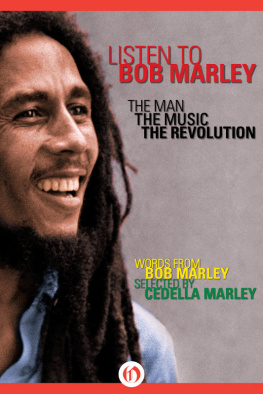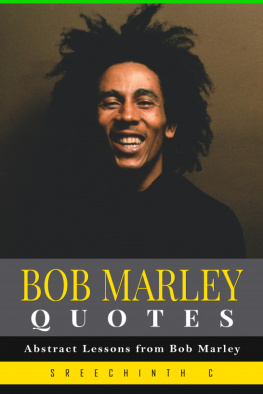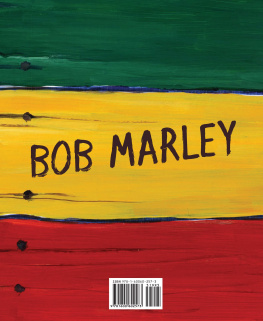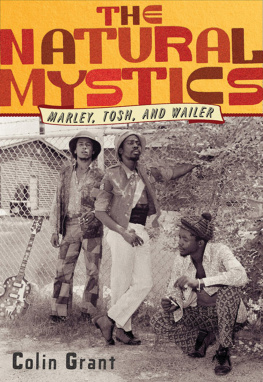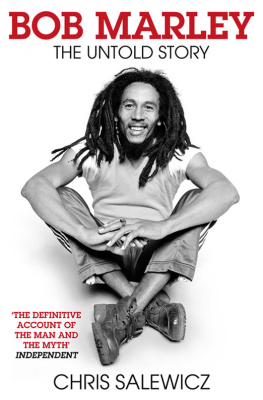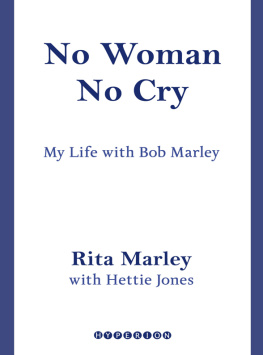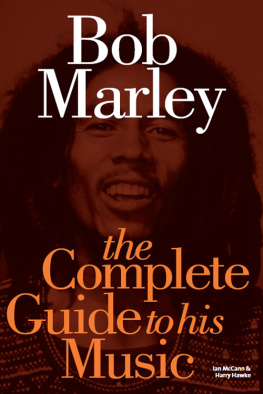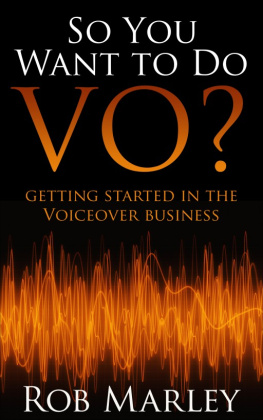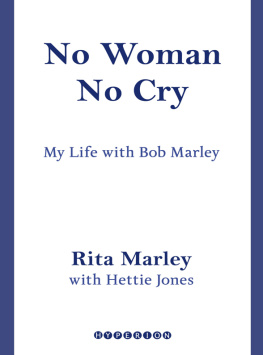Bob Marley - Listen to Bob Marley: The Man, the Music, the Revolution
Here you can read online Bob Marley - Listen to Bob Marley: The Man, the Music, the Revolution full text of the book (entire story) in english for free. Download pdf and epub, get meaning, cover and reviews about this ebook. year: 2012, publisher: Open Road Media, genre: Detective and thriller. Description of the work, (preface) as well as reviews are available. Best literature library LitArk.com created for fans of good reading and offers a wide selection of genres:
Romance novel
Science fiction
Adventure
Detective
Science
History
Home and family
Prose
Art
Politics
Computer
Non-fiction
Religion
Business
Children
Humor
Choose a favorite category and find really read worthwhile books. Enjoy immersion in the world of imagination, feel the emotions of the characters or learn something new for yourself, make an fascinating discovery.
- Book:Listen to Bob Marley: The Man, the Music, the Revolution
- Author:
- Publisher:Open Road Media
- Genre:
- Year:2012
- Rating:3 / 5
- Favourites:Add to favourites
- Your mark:
- 60
- 1
- 2
- 3
- 4
- 5
Listen to Bob Marley: The Man, the Music, the Revolution: summary, description and annotation
We offer to read an annotation, description, summary or preface (depends on what the author of the book "Listen to Bob Marley: The Man, the Music, the Revolution" wrote himself). If you haven't found the necessary information about the book — write in the comments, we will try to find it.
Listen to Bob Marley: The Man, the Music, the Revolution — read online for free the complete book (whole text) full work
Below is the text of the book, divided by pages. System saving the place of the last page read, allows you to conveniently read the book "Listen to Bob Marley: The Man, the Music, the Revolution" online for free, without having to search again every time where you left off. Put a bookmark, and you can go to the page where you finished reading at any time.
Font size:
Interval:
Bookmark:



bobmarley.com
This book was originally published as two volumes, created on the anniversaries of my dads fifty-sixth and sixtieth Earthdays. In each volume, I selected some of my fathers most prophetic poems and meditations, insights and conversational messages. I chose sayings that resonated with me and that were personally important to my dad as well. Within these books is a side of my father most people didnt get to see in his lifetime.
My dads thoughts and meditations were not circulated as widely as his music. He understood the power of music, but would be surprised to learn that the written word would soon be available in so many ways, and could be combined with music so meaningfully. In this ebook re-release, I had the opportunity to expand the existing material, adding video interviews, links to my fathers music, and new photographs. Fans of Bob Marley will enjoy reading his words, hearing his music, and learning about his life in a way that they never could have experienced before digital books existed. They will see he was not only a musician, but also a revolutionary.
My father was always an explorer, an innovator, and a philosopher. He said, Blessed reggae is a reggae when you deal with reality. You get more music, more anything. He always let his words and his music act as his messengers. He believed in unity and he expressed this philosophy in his music. He used his lyrics to connect people, to ask all of us to work together and trust one another. We should all come together and create music and love, he said. If he had an opportunity to expand his message of freedom, religion, and social change, he embraced it. I have no doubt that, if he were alive, he would have found a way to see how digital books would have helped him reach a wider audience around the world. Since his words and songs are really one and the samemessages for social changehow pleased he would be that in this project, they all come together.
My father still is truly an inspiration to so many. My family is livicated to making sure that his spirit thrives, along with the vibrancy of his music. We want his writings, his sense of the universe, his devotion to healing the world, and his endless charity to live on. My father passed quite young, and we did not get to spend the time with him that we wishedbut from his music and his writings, we understand what he believed and we try to promote those teachings and philosophies. Today, his music and his legacy are still vital, so it is important to my family and me to keep his words alive in every way possible, in every format available.
My dad said, My music will go on forever. Maybe its a fool to say that, but when me know facts me say facts. My music go on forever. He speaks the truth as always....
~Cedella Marley

Since his passing thirty years ago Bob Marleys legend looms larger than ever, his life and music are unparalleled in their global popularity and depth of influence. Bob Marley was posthumously inducted into the Rock and Roll Hall of Fame in 1994; in December 1999 his 1977 album Exodus was named Album of the Century by Time Magazine and his song One Love was designated Song of the Millennium by the BBC. Marleys Legend compilation has annually sold over 250,000 copies since its release in 1984, according to Nielsen Sound Scan, and it is only the 17th album to exceed sales of 10 million copies since SoundScan began its tabulations in 1991. These formidable achievements are all the more remarkable considering Bobs humble beginnings and the numerous challenges he endured trying to gain a foothold in Jamaicas chaotic music industry while skillfully navigating the politically partisan violence that abounded in Kingston, Jamaica throughout the 1970s.
One of the 20th centurys most charismatic and challenging performers Marleys renown now transcends the role of reggae luminary: he is regarded as a cultural icon who implored his people to know their history coming from the root of King David, through the line of Solomon, as he sang on Blackman Redemption. Urging his listeners to check out the Real Situation and to rebel against the vampiric Babylon System, Marleys lyrics continue to be mentally as well as physically liberating forces for Africans throughout the Diaspora and for oppressed peoples everywhere. Bob had a rebel type of approach but his rebelliousness had a clearly defined purpose to it, acknowledges Chris Blackwell, the founder of Island Records, who played a pivotal role in introducing Marley and the Wailers to an international audience. It wasnt just mindless rebelliousness, he was rebelling against the circumstances in which he and so many people found themselves.

Early Years
Born Nesta Robert Marley on February 6, 1945, to 50-year old white quartermaster Captain Norval Marley, who was affiliated with the British West Indian Regiment and an eighteen-year old black Jamaican woman, Cedella Malcolm Booker, Bob spent his early years in the rural community of Nine Miles. Located in the verdant parish of St. Ann, the residents of Nine Miles have kept alive many traditions tied to the their African ancestry.
Norval and Cedella married in 1945 but Marleys family strongly disapproved of their union; although the Captain provided financial support, he seldom saw his son. The last time Nesta saw his father was when he took him to Kingston, supposedly to enroll him in school. Eighteen months later Cedella learned that Nesta wasnt attending school and was living with an elderly couple. Alarmed, she went to Kingston, searched, found Nesta and took him home to St. Ann.
In the late 1950s Bob, barely into his teens, left St. Ann with his mother and returned to Jamaicas capital. They eventually settled in a vicinity of western Kingston called Trench Town, so named because it was built over a sewage trench. A low-income, disenfranchised community comprised of government yards and squatter settlements Trench Town was nonetheless abundantly blessed with musical talent; Bob would later immortalize the area in his songs No Woman No Cry (1974), Trench Town Rock (1975) and Trench Town (released posthumously in 1983).
By the early 1960s the islands music industry was beginning to take shape and its development gave birth to an indigenous popular Jamaican music: ska. A local interpretation of American soul and R&B, with an irresistible accent on the offbeat, ska exerted a widespread influence on Jamaican youth. Music offered an escape from their otherwise harsh realities and the elusive lure of stardom was now a tangible goal within the burgeoning Jamaican music industry.
About this time, 16-year-old Bob Marley decided to embark on his dream of becoming a musician. While working as a welder Bob met aspiring singer Desmond Dekker, who would top the UK charts in a few years with his single Israelites. Dekker introduced Marley to another young singer Jimmy Cliff the future star of the immortal Jamaican film The Harder They Come. By age 14, Cliff had already recorded a couple of hit songs. In 1962 Cliff introduced Marley to producer Leslie Kong for whom he cut his first singles Judge Not, Terror and One More Cup of Coffee, a cover of the million selling country hit by Claude Gray. When these songs failed to connect with the public, Kong refused to pay Bob, an exploitative practice that was widespread during the infancy of Jamaicas music business.
Next pageFont size:
Interval:
Bookmark:
Similar books «Listen to Bob Marley: The Man, the Music, the Revolution»
Look at similar books to Listen to Bob Marley: The Man, the Music, the Revolution. We have selected literature similar in name and meaning in the hope of providing readers with more options to find new, interesting, not yet read works.
Discussion, reviews of the book Listen to Bob Marley: The Man, the Music, the Revolution and just readers' own opinions. Leave your comments, write what you think about the work, its meaning or the main characters. Specify what exactly you liked and what you didn't like, and why you think so.

